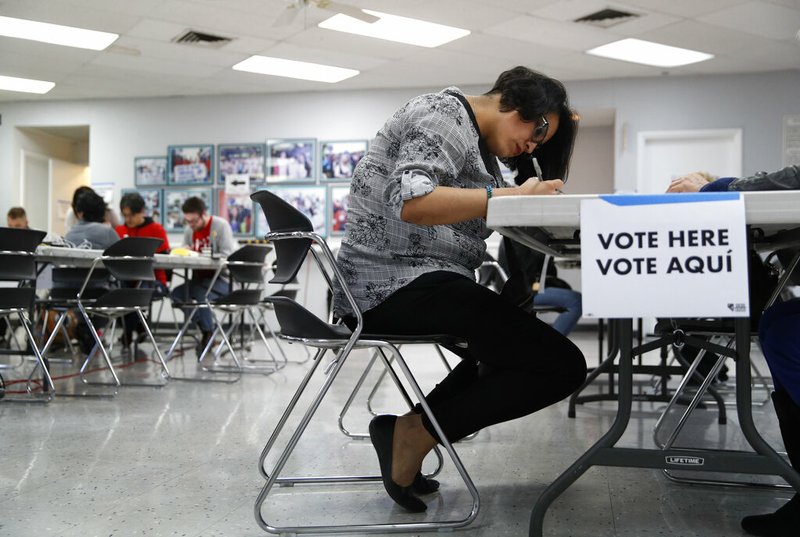LAS VEGAS — Voting is underway across Nevada as the most diverse state so far has its say in the Democrats' nomination fight.
Uniformed housekeepers and casino workers streamed into the Bellagio on Saturday, one of seven casino-resorts on the Las Vegas Strip among 200 caucus locations statewide hosting caucuses. Nevada is the third contest on a 2020 election calendar marked by chaos and uncertainty after the opening votes in Iowa and New Hampshire, overwhelmingly white, rural states.
The first presidential contest in the West will test the candidates' strength with black and Latino voters for the first time in 2020.
"Nevada represents an opportunity for these candidates to demonstrate their appeal to a larger swath of our country," said state Attorney General Aaron Ford, a Democrat who is not endorsing a candidate.
Nevada's population aligns more with the U.S. as a whole, compared with Iowa and New Hampshire: 29% Latino, 10% black and 9% Asian American and Pacific Islander.
Minnesota Sen. Amy Klobuchar, a moderate who has struggled with minority voters, was already playing down the caucuses and looking past Nevada.
"This is a big day. We're excited. But it is the beginning of the next chapter in our campaign, and this chapter is going to be really fast-moving because we have so many states that we're going to be covering, and so many events," she told volunteers at her Las Vegas campaign headquarters.
The vote comes at a critical moment for the Democratic Party.
Self-described democratic socialist Bernie Sanders has emerged as the clear front-runner as a half-dozen more moderate candidates savage one another. Each wants to be the preferred alternative to the Vermont senator in the race to take on President Donald Trump in November.
Meantime, questions lingered about Nevada Democrats' ability to report election results quickly and new concerns surfaced about foreign interference in the 2020 contest.
Sanders confirmed reports that he had been briefed by U.S. officials about a month ago that Russia was trying to help his campaign as part of Moscow's efforts to interfere in the election.
"It was not clear what role they were going to play," Sanders said. "We were told that Russia, maybe other countries, are going to get involved in this campaign."
He added: "Here's the message to Russia: Stay out of American elections."
Despite the distraction, Sanders was confident about Nevada. He has strong support from Latinos and rank-and-file union workers who have warmed to his calls to transform the nation's economy and political system to help the working class.
There was skepticism about Pete Buttigieg's ability to win over a more diverse set of voters after strong finishes in Iowa and New Hampshire. Joe Biden, who struggled in those early states, looked to Nevada's voters of color to prove he still has a viable path to the nomination.
Elizabeth Warren and Klobuchar were fighting for momentum, hoping to benefit from a sudden surge of outside money from newly created super PACs.
Billionaire Tom Steyer spent more than $12 million of his own money on television advertising in Nevada, according to data obtained by The Associated Press.
New York billionaire Mike Bloomberg, who dominated the political conversation this week after a poor debate-stage debut, wasn't on the ballot. He's betting everything on a series of delegate-rich states that begin voting next month.
The caucuses were the first since technical glitches and human errors plagued Iowa's caucuses. Nearly three weeks later, state Democratic officials have yet to post final results.
Nevada Democrats have projected confidence in their process, although Democratic National Committee Chairman Tom Perez has refused to commit to releasing the full results on the day of the vote. He said a number of factors, including early voting and potentially high turnout, could affect the tabulation and timing of results. In addition, Nevada, like Iowa, reports three sets of data from the multistage caucus process.
One potential complication is the reporting system.
On Friday, party leaders issued a memo clarifying that, while caucus leaders can still use an online form to submit results from individual precincts, they should use a dedicated hotline to call and text in results as their primary form of reporting.
In Iowa, overwhelmed phone lines caused caucus leaders to wait on hold for hours, contributing to the delay in reporting the results. Nevada Democrats brought in extra help from other state parties to help handle the reporting process Saturday night.
Early voting is likely to pose another challenge for calculating the caucus results.
The state party has added to its responsibilities by offering early voting, which Iowa did not attempt. The party said nearly 75,000 Democrats cast early ballots, and a majority were first-time caucus-goers. In 2016, a total of 84,000 Nevada voters participated in the Democratic caucuses.
A small, but significant number of the ballots cast early were disqualified.
Of the more than 36,000 ballots that were cast through Monday, 1,124 ballots were voided largely because voters forgot to sign them, according to the state party, which did not release the final numbers. Party officials said they were reaching out to these voters and encouraging them to caucus in person on Saturday.

